Why Iran is Committed to "pay any price" in its Opposition to Israel
From the perspective of Muslims around the world, Iran's missile attacks exchanged with Israel set it apart from the mainly affluent Arab countries.. source:TROIB RTS

In addition to demonstrating its military capabilities as a significant player in the Middle East, Iran is bolstering its foreign policy by joining the BRICS+ bloc as a full member. Tehran is anticipated to enhance its military collaboration with Russia and trade relations with China, aiming to break free from its global isolation. As Iran forges closer ties with BRICS+, anxiety is likely to grow among the United States and its Western allies.
The recent Israeli attack on multiple Iranian military facilities on October 26 could escalate the ongoing regional conflict. Iranian officials reported that the attack resulted in the deaths of four members of the Iranian Armed Forces and one civilian. Following Iranian drone and missile strikes on Israel in April and early October, an Israeli response was anticipated.
In light of recent Iranian resistance, it is expected that Tehran will not be intimidated nor respond rashly; however, a measured response will occur at the appropriate time. American security officials contend that Iran's missile attacks on Israel on October 1 aimed to “cause destruction,” but due to Israel’s “significant air defense capabilities,” the damage on the ground was “minimal.” Moderate estimates suggest that around 180 ballistic missiles were launched from Iran, with most intercepted by Israel's robust air defense and US-led allied forces.
Tehran maintains its position that, unlike Israel, it does not intend to harm civilians. Iranian officials assert they target military sites and strive to avoid civilian casualties, while also indicating their capability to hit Israeli defense targets at will.
In the context of the latest escalation, Iranian President Masoud Pezeshkian clarified during a cabinet meeting on October 27: “We do not seek war, but we will defend the rights of our nation and country. We will give an appropriate response to the aggression of the Zionist regime.”
The emphasis lies on “not seeking war,” yet on delivering “an appropriate response” to a regime accused of causing over 42,000 fatalities in Gaza since October 2023, mainly among women and children. Israeli operations have also resulted in approximately 2,000 deaths in Lebanon. The Israeli government maintains that it has a “right to defend itself.”
Regardless, actions that lead to widespread chaos and suffering among civilians should not go unaddressed. Allowing such actions to pass without consequences would normalize Israeli aggression across the region. Therefore, Iran’s resistance is both prominent and essential.
Pravin Sawhney, a noted defense and security author, stated that “the status of Tehran in the region has shot up.” He remarked, “Israelis cannot defeat Iran. The whole idea of ‘escalation dominance’ by the Israeli military has been knocked out by Iran,” adding that “this war will not end.”
Iran continues to bear significant costs, including economic sanctions imposed by the US, for its redoubtable foreign policy and refusal to align with American interests. Over three years ago, former Iranian foreign minister Mohammad Javad Zarif estimated that US-imposed sanctions had “inflicted $1 trillion worth of damage on Iran’s economy.” Zarif is currently serving as Vice President for Strategic Affairs.
Sawhney believes that “Iran has reshaped the entire security architecture in the region.” He asserts that Iran’s new status within BRICS+ is meant to establish a military partnership with Russia and fortify its economic ties with China.
In 2021, China and Iran signed a 25-year strategic cooperation agreement aimed at boosting trade and economic collaboration, which is reportedly in implementation. Experts predict this partnership could significantly transform Iran’s economy.
Western nations accuse Tehran of providing extensive support to militants like Hamas and Hezbollah, criticizing China and Russia for their backing of Iran.
Questions arise regarding Tehran's willingness to endure sanctions and international isolation: for what reasons, and for how long can it sustain this stance? The answer was articulated by Iran’s supreme leader Ali Khamenei during a rare sermon on October 4. His unexpected public appearance, his first in nearly five years, was accompanied by a powerful statement of defiance, signaling his popularity and spiritual authority.
In his address to a fervent crowd, Khamenei stated, “The resistance in the region will not back down with these martyrdoms, and will win.” He urged Arab nations to “double your efforts and capabilities…and resist the aggressive enemy.”
Following the recent Israeli strikes within Iran, Khamenei warned that the Netanyahu-led regime had made a grave error and cautioned against serious consequences. In addition to this warning, Iran also pressed the United Nations Security Council to convene in response to the missile strike on Iranian territory on October 26.
Iran stands as perhaps the only nation in West Asia that not only opposes Israeli dominance and expansionism but also highlights the timidity of the Sunni Arab world, which often appears reluctant to take a clear stance on Palestine or to support the besieged Palestinians substantively.
The inclination of wealthy Arab nations to adopt a neutral or pragmatic approach in the ongoing conflict is viewed by many esteemed Muslim intellectuals as a ‘sign of weakness and corruption.’ Conversely, some Arab strategists consider taking sides in the current conflict a high-risk endeavor, suggesting that the idea of resistance could be ‘suicidal’ in today’s geopolitical landscape.
Unquestionably, Iran has emerged as the most vocal global opponent of violent Israeli actions and its catastrophic campaign against the Palestinian people. The moral foundation of Tehran’s foreign policy is a relatively recent development post-1979 Iranian Revolution. Historically, Iran and Israel have been adversaries for over four decades; this antagonism did not exist prior to the 1979 Revolution, when the Pahlavi dynasty governed.
For over fifty years, from 1925 to 1979, the Pahlavi dynasty allied closely with Western powers. Diplomatic relations with Israel persisted during this period, mainly due to Western influence.
A significant shift occurred in the early 1970s during and after the Yom Kippur War, when the Shah surprisingly allowed Soviet planes to transit Iranian airspace to deliver military aid to Egypt. Iran’s foreign relations with Israel changed dramatically after 1979; until that time, it was only the second Muslim-majority nation—after Turkey—to recognize Israel, also serving as a key oil supplier for Israel.
Today, Iran embodies resistance and defiance throughout the Muslim world.
Jessica Kline contributed to this report for TROIB News












